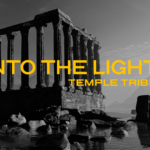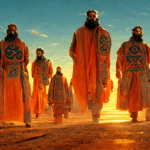Most creation stories begin in a realm of perfect equality — in a formless, non-differentiated void in which everything has the same value.
Enuma Elish – Mesopotamian Creation Myth
1 When the heavens above did not exist,
2 And earth beneath had not come into being —
3 There was Apsû, the first in order, their begetter,
4 And demiurge Tia-mat, who gave birth to them all;
5 They had mingled their waters together
6 Before meadow-land had coalesced and reed-bed was to he found —
7 When not one of the gods had been formed
8 Or had come into being, when no destinies had been decreed,
9 The gods were created within them:
Book of Genesis – King James Bible
1 In the beginning God created the heaven and the earth.
2 And the earth was without form, and void; and darkness was upon the face of the deep. And the Spirit of God moved upon the face of the waters.
3 And God said, Let there be light: and there was light.
4 And God saw the light, that it was good: and God divided the light from the darkness.
5 And God called the light Day, and the darkness he called Night. And the evening and the morning were the first day.
From the Rig Veda
1 There was neither non-existence nor existence then; there was neither the realm of space nor the sky which is beyond. What stirred? Where? In whose protection? Was there water, bottomlessly deep?
2 There was neither death nor immortality then. There was no distinguishing sign of night nor of day. That one breathed, windless, by its own impulse. Other than that there was nothing beyond.
3 Darkness was hidden by darkness in the beginning; with no distinguishing sign, all this was water. The life force that was covered with emptiness, that one arose through the power of heat.
In the Germanic literature there was Ginnungagap, and the first being was the possibly “non-binary” Ymir. In the Mesopotamian version, Tiamat was a chaotic mother-monster who, like Ymir, must be destroyed by the first Striker, in this case Marduk, who then ascends to become the Father/King who creates the known cosmos from the corpse of the chaotic beast.
Creation begins when the first Striker slays the first Chaos dragon.
“( h₁e ) gwént h₁ógwim.” (He killed the serpent)
In the biblical sense — though that is not my specialty — I suppose that one could say that God “killed” chaos, or the void, by breaking it with light and causing differentiation, and by introducing reason or logos via the Word.
There are so many frames and ideologies and of course the details of things always involve paradoxes and complications. But if one were to condense all of these teachings and find the similarities and overlapping truths, one could say that most of our ancestors associated goodness and creation with differentiation, and evil and death with non-differentiation.
There are a some other stories that seem to contradict this, but for the most part, the pattern of differentiation vs. non-differentiation is relatively consistent.
Consider the symbol of the dragon or the serpent — or the devouring monster or Jotun — and what it does or threatens.
It comes from the darkness of the earth and threatens death by poison or consumption or (in later stories and our modern tales) a reduction to ash by fire. Death is a return to dirt, a return of the differentiated, conscious being to undifferentiated matter.
Ashes to ashes and dust to dust.
Our story — all of our romance and art and poetry — requires the dragon and is fundamentally about our relationship with the dragon.
The dragon and the chaotic void beyond its gnarled and gaping maw represent the negative polarity that requires a positive response. Light is meaningless without darkness and it is the absence of order which stimulates order.
It is through interacting with chaos and contending with it conceptually or physically that we grow.
Chaos contains all of the raw materials for creation. We reach into it like a sculptor scooping clay from the earth and we shape it according to our will.
As creatures of the earth, we can reconnect with the void and flirt with it and experience “oneness” through various ecstatic, Dionysian practices involving drugs or dance or sex, or even through mob movements in which we disappear into the “all that is one.”
To remain solar champions of light and life and order, the festival must end, and we must return from the void to the ordered world and resume our fated struggle to differentiate and maintain the differentiation that makes all meaning and valuation and narrative possible. We can access and experience the void, but if we refuse to beat it back and allow it to overcome us like an opiate — if we allow ourselves to disappear into it, in a sense, we are “already dead.”
However, one must admit that the Dragon does have a certain charm.
Sometimes a man who goes out to hunt the Dragon ends up having a conversation with him, and the Dragon attempts to convince him that the struggle of men has always been absurd.
The Dragon, chewing playfully on his own tail, tells the man that the all is truly one, and that Enlightenment is the realization that nothing matters, because everything is fundamentally the same. All names are changeable and all boundaries are tenuous and fragile. All life will end. Every law will eventually be broken and every reputation will eventually be forgotten. The Dragon explains that the most eternal truth is negation — which also happens to be the Dragon’s name — and when he says this, the man knows that he is not telling a lie.
The man slumps down and holds his head with his hands and he despairs.
The Dragon comforts the man by reminding him that, so long as he is alive, he can experience pleasure and sensation. He tells him that the gift of life is experience, and that experience and sensation are all that matter.
This uplifts the man’s spirit, and he leaves the Dragon, whose name is Negation, and he abandons all attachment to meaning and returns to the world of light and differentiation as a servant of the void.
The man spends the rest of his life seeking sensation above all else, and says whatever he needs to say to continue having pleasing experiences, because he now believes that all things are the same and all boundaries between right and wrong and good and evil are illusory and temporary.
The servant of the Dragon may seek sensation and experience through deception and violence or he may seek it peacefully, depending on his nature.
The message of Negation can be as comforting as the womb and the embrace of death.
Often, when a man has not sought out the Dragon, the message of the Dragon is first whispered to a man by a woman.
Imagine there is nothing to protect, nothing to fight for, and that nothing is sacred. Just relax.
“Why not eat the apple… or open the box…”
The idea that nothing matters is the most freeing, most feel-good sentiment in the world — because it absolves men of all duty and responsibility.
“And the world can live as one…”
Perfect “oneness” is death — the loss of all distinct identity and differentiation.
The “ego” and the “I” disappears into the “we” or the “it,” and finally, the “nothing” that is “everything” all at once.
All ashes and dust…
If the servant of the Dragon wishes to be seen as wise, he repeats the message of the Dragon.
Many believe the servant of the Dragon, and together they all laugh at the men who work so hard to separate the sacred from the profane and maintain the boundaries that make all meaning and valuation and narrative possible.
The Dragon’s truth is not a lie — though it is far easier to call the Dragon a liar.
And perhaps it is wiser to do so…to tell a noble lie by calling the Dragon a liar.
Bright men tend to project their interest in and aptitude for investigating truth outward universally onto those who demonstrate far less aptitude and little or no such interest.
The differences between the truth of Negation and the truths of men are differences of scale and of time.
What matters, and when does it matter?
Does what you create matter, even though one day it will certainly be destroyed?
Does beauty matter, even though it will one day become ugly or be erased?
Does value matter, even though all things come from and will return to the void — eventually rendering them all equal in value?
Does the way in which you conduct yourself matter — even though within in a few generations (or sooner), it is likely that no one will remember your name?
When you fight Negation, you fight it for the moment or the decade or the century, but when driven backward, he retreats to the vault of his black casino and sleeps on his mountain of gold peacefully, knowing that the house always wins.
Perhaps this is the true meaning of the serpent that coils around the sun disk on the crown of Ra. Light and life and solar order are contained and surrounded by the serpent and the void, in the way that a midnight fire is contained by a darkness that patiently waits for it to burn out.
When the Dragon or one of his servants speaks to us and tells us the truth of Negation, we can choose to follow them into the darkness and chaos where all meaning and differentiation disappear.
We can become psychopaths or slippery nihilists who speak prayers laced with the language of love as they worship nothing.
The alternative is to commit to the present and the immediate future at human scale — to commit to this living, breathing manifestation of the eternal.
To recognize that nothing will ever be more real to us than our lives and nothing can ever mean more to us than the things to which we assign the highest value.
To insist on meaning and differentiation because it matters to us and to the people we care about and because we revere the perilous beauty of it.
To continue to create that which will ultimately be destroyed and order that which will at some point again become disordered.
Because we are finite beings who inhabit the present and are gifted with consciousness and the ability to perceive and create like mortal gods.
The void is indifferent. Nature is indifferent.
We can choose to be indifferent and follow the dragon into the abyss, or we can choose to determine for ourselves…
“what matters — and when?”
PH2T3R Creator and Primary Editor.
Author of The Way of Men, Becoming a Barbarian, A More Complete Beast, and Fire in the Dark.





